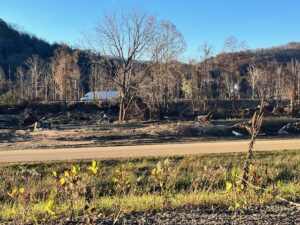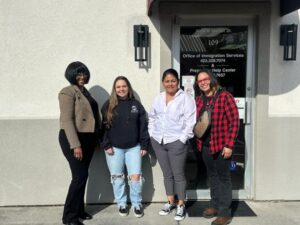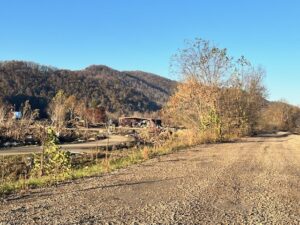Catholic Charities Staff Lay Foundation for Long-Term Disaster Recovery in East Tennessee
As Catholic Charities of the Diocese of Raleigh continues its critical role in Hurricane Helene recovery efforts, staff members reflect on their recent deployments to East Tennessee, where they collaborated with local agencies to help hurricane survivors. In October and November, three staff members from Catholic Charities of the Diocese of Raleigh traveled to East Tennessee for rotating two-week deployments as part of the Staff Assistance Program coordinated by Catholic Charities USA.
Most recently, Fayetteville Region Program Director Vicky Jiménez and Cape Fear Region Disaster Specialist Vickie Sasser, who brought years of experience and compassion to this mission, returned from their time in East Tennessee. Both worked on the front lines following multiple North Carolina hurricanes, most notably, catastrophic Hurricanes Matthew in 2016 and Florence in 2018.

During her time in East Tennessee, Jiménez saw firsthand how Hurricane Helene devastated local communities, much like the damage she witnessed back home in Columbus County, NC. Jiménez shared her experience in Unicoi County, one of the hardest-hit areas. Jiménez emphasized teamwork in long-term recovery efforts. “Teamwork makes the dream work! By bringing in our expertise and guiding local teams, we help them develop disaster case management strategies tailored to their needs,” she said. “Catholic Charities cannot do everything, but by collaborating with government and nonprofit agencies, we maximize resources to help families regain safety and stability.”
In her time in East Tennessee, Jiménez worked with two newly hired disaster case managers as they embarked on the daunting task of helping families recover.
“One of the new hires was from Unicoi county, someone who was personally impacted by the storm. Her motivation and dedication to her community was truly inspiring,” Jiménez recounted. “She was a breath of fresh air, always smiling and ready to hit the ground running. Knowing she was in place gave me peace, leaving Tennessee confident that the mission would continue effectively.”
For new disaster case managers, Jiménez offered practical advice: “Recognize how the disaster has impacted you, so you know your limits. You can’t help everyone, and you don’t have all the resources. Know your organization’s strengths and build connections with others. Remember, this work is a marathon, not a sprint.”

Applying Lessons from Past Disasters
Disaster Specialist Vickie Sasser has extensive experience responding to hurricanes. She’s worked tirelessly for survivors of Hurricanes Matthew and Florence and shared the lessons she took to Tennessee. “Having up-to-date resource information is critical during all disaster phases. From evacuation routes during preparedness to rebuilding assistance in recovery, accurate information can make a significant difference.”
Sasser also emphasized strategic planning. “Assess resources quickly, engage with local communities, and prioritize life-saving requirements like medical care, food, and shelter,” she explained. “Coordination with local agencies and adaptability are key to making the most out of limited resources.”
For Sasser, faith plays a vital role in her work as well. “Faith and prayer are my bedrock. In times of chaos, they provide clarity and resilience. Sometimes, the smallest acts of kindness can feel like miracles to survivors. That’s the hope we aim to bring—help, hope, and service to all.”
Building a Foundation for the Future
Alongside government, religious, and community organizations, Jiménez and Sasser were laying the groundwork for years of recovery. Their expertise, compassion, and faith demonstrate Catholic Charities’ commitment to responding after disasters.
With each deployment, Catholic Charities not only provided immediate relief but also empowered communities to rebuild and thrive again, hoping to ensure that no one faces the long-term recovery journey alone.

